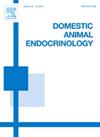Poor maternal nutrition during gestation in sheep alters key hormonal systems involved in energy homeostasis and appetite in the offspring
IF 2.1
2区 农林科学
Q2 AGRICULTURE, DAIRY & ANIMAL SCIENCE
引用次数: 0
Abstract
Disturbances in maternal nutrient availability through increased or decreased abundance of specific or total nutrients during pre-natal development can have negative impacts on offspring growth. These changes are likely mediated, at least in part, by hormonal systems that control energy homeostasis and appetite. Regulation of insulin signaling is critical to ensuring appropriate glucose homeostasis. Poor maternal nutrition during gestation impacts circulating glucose and insulin concentration in both the dam and offspring, reducing circulating insulin and glucose in offspring of restricted-fed dams and increased circulating insulin and glucose in the offspring of over-fed dams. Leptin and ghrelin are key regulators of appetite and feed intake. Offspring of over-fed ewes often exhibit leptin resistance, which may lead to changes in adiposity. Leptin responses in offspring of restricted-fed ewes are not well defined, although restricted-fed ewes themselves exhibit decreased circulating leptin concentrations. Little is known about the effects of poor maternal nutrition on offspring ghrelin. Glucocorticoids and thyroid hormones are required for appropriate fetal development. Poor maternal nutrition during gestation alters the development of the hypothalamic-pituitary-adrenal and thyroid axes in the offspring, although the effects vary according to the type, duration, timing, and severity of the nutritional insult. The relationships between insulin, leptin, ghrelin, glucocorticoids, and thyroid hormones can result in synergistic effects, exacerbating negative outcomes for the offspring. The impacts of poor maternal nutrition are multi-faceted, and the resulting alterations in body composition can continue to impact hormone regulation beyond the initial insult caused by poor maternal nutrition during gestation.
绵羊妊娠期间母体营养不良会改变与后代能量平衡和食欲有关的关键激素系统。
在产前发育期间,通过增加或减少特定或总营养素丰度而引起的母体营养可利用性紊乱可对后代生长产生负面影响。这些变化可能是由控制能量平衡和食欲的荷尔蒙系统介导的,至少部分是这样。胰岛素信号的调节是确保适当的葡萄糖稳态的关键。妊娠期母体营养不良会影响母鼠和子代的循环胰岛素和胰岛素浓度,限制喂养母鼠子代的循环胰岛素和葡萄糖浓度降低,过量喂养母鼠子代的循环胰岛素和葡萄糖浓度升高。瘦素和胃饥饿素是食欲和采食量的关键调节因子。过度喂养母羊的后代经常表现出瘦素抵抗,这可能导致肥胖的变化。限制喂养母羊的后代瘦素反应尚不清楚,尽管限制喂养母羊本身表现出循环瘦素浓度降低。关于母体营养不良对后代生长素的影响,人们知之甚少。糖皮质激素和甲状腺激素是胎儿正常发育所必需的。妊娠期母亲营养不良会改变后代下丘脑-垂体-肾上腺和甲状腺轴的发育,尽管其影响因营养不良的类型、持续时间、时间和严重程度而异。胰岛素、瘦素、胃饥饿素、糖皮质激素和甲状腺激素之间的关系可能导致协同效应,加剧对后代的负面影响。母亲营养不良的影响是多方面的,由此导致的身体成分的改变可以继续影响激素调节,而不仅仅是怀孕期间母亲营养不良造成的最初损害。
本文章由计算机程序翻译,如有差异,请以英文原文为准。
求助全文
约1分钟内获得全文
求助全文
来源期刊

Domestic animal endocrinology
农林科学-奶制品与动物科学
CiteScore
5.50
自引率
4.80%
发文量
58
审稿时长
31 days
期刊介绍:
Domestic Animal Endocrinology publishes scientific papers dealing with the study of the endocrine physiology of domestic animal species. Those manuscripts utilizing other species as models for clinical or production problems associated with domestic animals are also welcome.
Topics covered include:
Classical and reproductive endocrinology-
Clinical and applied endocrinology-
Regulation of hormone secretion-
Hormone action-
Molecular biology-
Cytokines-
Growth factors
 求助内容:
求助内容: 应助结果提醒方式:
应助结果提醒方式:


